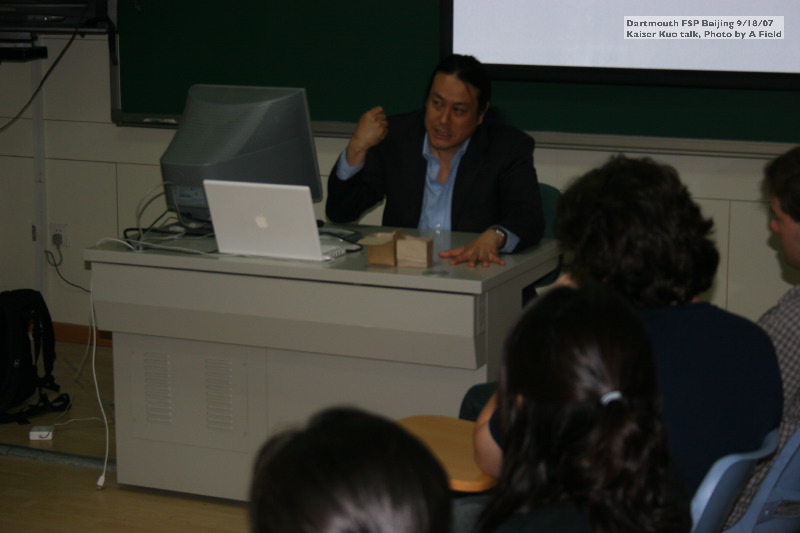
Above: Kaiser Kuo riffing on life in China to Dartmouth FSP students. For more photos see my Beijing photo page.
Last night (Tues Sept 18) we were graced by the presence of none other than legendary Tang Dynasty rock guitarist, Kaiser Kuo. Born in New York and raised in Arizona, Kaiser comes from a family of Taiwanese immigrants with strong Guomindang ties. After graduating from Berkeley in 1988, Kaiser decided to fulfil the ambitions of his KMT grandparents by re-conquering China, not with the sword, but with the pen and the guitar. He came out to Beijing in the late 1980s and founded a band called Tang Dynasty, arguably China’s first and foremost heavy metal band. In the ‘90s the band took China by storm, becoming the most widely recognized rock act in China other than Cui Jian and Black Panther (Hei Bao). After the events of June '89 Kaiser returned to Arizona to pursue a graduate degree in Chinese politics and culture, focusing on the Tiananmen Crisis for his MA thesis--an event that he’d personally witnessed and participated in. In the ‘90s he gave up his academic career and returned to China to rock, rejoining his band. A painful breakup followed soon after the events of ’99, when nationalism in China reared its ugly head following the bombing of the Belgrade embassy. As to the real reasons behind the breakup, well, I’ll leave it to Kaiser to blog that story.
In 2001 Kaiser formed another band called Spring and Autumn (Chun Qiu) along with singer-songwriter-guitarist Yang Meng, who hails from Yunnan, and major rock guitarist Kuo Zhengyu and others. They still perform in Beijing today (for video clips of Kaiser and his new band, see my youtube site: www.youtube.com/andrewfield. Also see my previous blog on the band). He has worked as a writer for various magazines including Red Herring, and still contributes regular columns to That's Beijing. More recently Kaiser landed a job as an executive with Ogilvy & Mather. Corporate drone? Maybe, but the rocker in Kaiser still lives on. He may wear a navy blue suit, but at least he hasn't cut his hair yet.
Last night Kaiser rapped with us for around 90 minutes about life in China. It was a rousing discussion, with Kaiser riffing on all sorts of subjects, from the technocracy that controls China today, to the drug habits of China’s most notorious rockers. Highlights of the talk included a long and detailed account of the rise and fall of Tang Dynasty from Kaiser’s own perspective (again, subject matter that he may wish to reveal himself in his inevitable memoir later on down the road). He also spoke at length about the pleasures and perils of doing business in Beijing, focusing on the internet industry, which he knows so well. The Dartmouth students grilled him with a few questions about his own identity as a Chinese American rocker who has integrated himself into Mainland society. Kaiser responded with his inevitable humor and style.
Another highlight was when Kaiser told us the different slang terms that rockers in China use for getting high. There’s “feile” (“flying”) for a pleasant high, and when you’re really wasted, you’re “guale” (“hanged”). The fact that our FSP director is named Fei Laoshi was not overlooked by this humorous fellow. Laughing at my expense has become a regular pastime among the Dartmouth FSPers, and Kaiser figured this out pretty quickly and used it to his advantage.
Perhaps the most interesting point Kaiser made about the rock scene in China is that it’s not government censorship that keeps rock down here, but rather market forces. According to Kaiser’s analysis, the soft pop music scene nurtured in Hong Kong and Taiwan (and now infecting the Mainland at an alarming rate) and supported by a pantheon of pretty film stars cum singers is simply way too strong to be penetrated by the more raucous sounds of rock, punk, or metal. Beijing may have hundreds of rock bands, but they don’t really know how to promote themselves or expand their presence (though some are doing so in a limited way--e.g. Brain Failure and New Pants). Still, compared to the soft power of bubbly soda pop, the “tiger’s salad” of rock is hard to stomach.
Well, let’s hope that this situation changes over the next few years. Somehow I have a feeling it will.